British actor-manager Sir John Martin Harvey (1863-1944) was one of the last great romantic actors of the English theatre. His most famous play was 'The Only Way' (1899), an adaptation of Charles Dickens' 'A Tale of Two Cities'. 25 years later, he also featured in the film version, as well as in a few other silent and sound films.
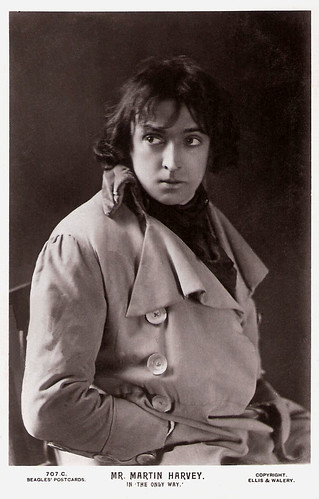
British postcard by Beagles Postcards, no. 707 C. Photo: Ellis & Walery. Publicity still for the stage play 'The Only Way'.
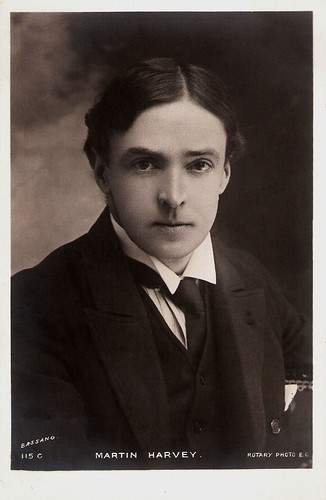
British postcard by Rotary Photo E.C., no. 115 C. Photo: Bassano.
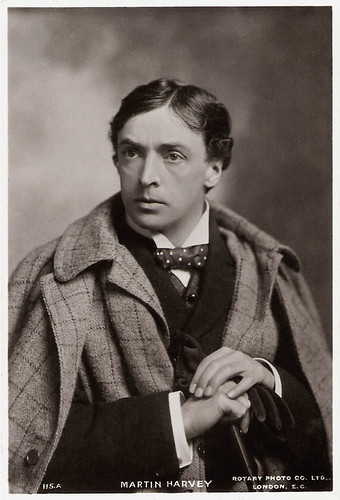
British postcard by Rotary Photo Co. Ltd., London, no. 115. A.

British postcard by Rotary Photo E.C., no. 115 J. Martin Harvey as Pelleas in Maurice Maeterlinck's 1893 stage play 'Pelleas and Melisande' (Pelléas et Mélisande). Harvey had success with the play in 1898, 1900, and 1911, with Mrs Patrick Campbell as Melisande and incidental music written for the production by Gabriel Fauré.

British postcard by Rapid Photo Co., London, no. 2961. Martin Harvey as Pelleas in Maurice Maeterlinck's 1893 stage play 'Pelleas and Melisande' (Pelléas et Mélisande).
John Martin Harvey was born in Wivenhoe, Essex, in 1863. He was the son of John Harvey, a yacht designer and shipbuilder, and Margaret Diana Mary Goyder.
He was educated at the Old Grammar School in Paisley and the King’s College School in London. His father expected him to follow his own profession, but Martin Harvey had his sights set on the stage.
One of his father's clients was the dramatist W. S. Gilbert, and it was through Gilbert that young 'Jack' Martin Harvey met his first teacher, John Ryder. At the age of 18, he made his first public appearance at the Court Theatre in London in the play 'To Parents and Guardians' in 1881.
A year later he joined Sir Henry Irving's Lyceum Theatre company. His first role was a non-speaking part in William Shakespeare's 'Much Ado About Nothing'.
He remained there for 14 years, playing minor parts in London but leading parts during summer tours in such plays as 'Lady of Lyons', 'Othello' and 'The Corsican Brothers'. He also travelled four times with the company to the United States.
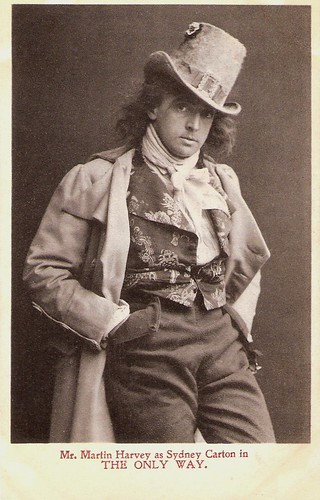
British postcard by the London Stereoscopic Company. Photo: publicity still for 'The Only Way'.
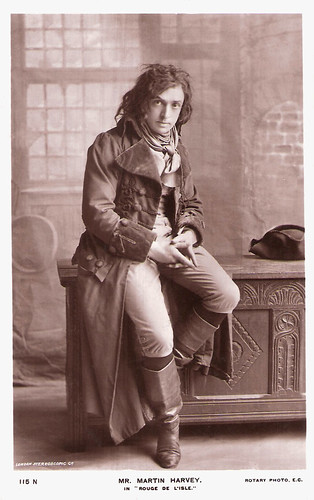
British postcard by Rotary, no. 115 N. Photo: London Stereoscopic Co. Still for the play 'Rouget de l'Isle' by Freeman Wills and Fitzmaurice King. Martin Harvey performed the play about the composer of the French National Anthem, 'La Marseillaise', at the Prince of Wales Theatre, London, in May 1900.
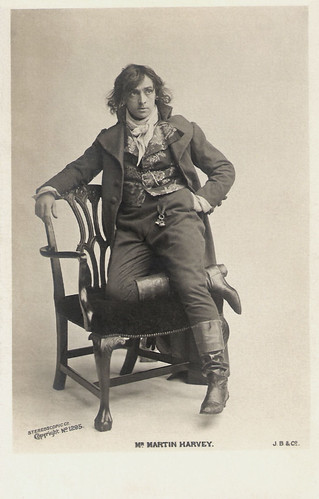
British postcard by J. Beagles & Co. Ltd., London, no. 1295. Photo: The Stereoscopic Co.
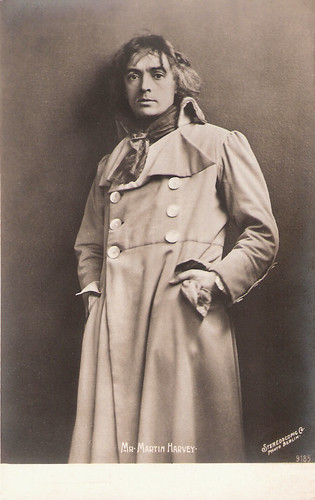
British Rotophot postcard by J. Beagles & Co, London, no. 9185. Photo: Stereoscopic Co., Berlin.
John Martin Harvey's greatest success came in 1899 when he took over the management of the Lyceum. He excelled in the lead role of Sydney Carton in 'The Only Way', and his wife, Nina de Silva, played Mimi. She had suggested, planned, and named the play, an adaptation of Charles Dickens' 'A Tale of Two Cities'. There was already a play called 'Sidney Carton, or a Tale of Two Cities'.
In the end, the playwrights were two Irish clergymen, Freeman Wills and Frederick Langbridge but it was Angelita who came up with the title 'The Only Way'. Years later, it was made into a film, The Only Way (1927) shot at Twickenham Studios. John Martin Harvey starred in the lead role and the film was a commercial success.
Harvey’s other successes included the title role in 'Hamlet' (1904) and Pelleas in Maurice Maeterlinck's 'Pelleas and Melisande' (1898, 1900, 1911), with Mrs Patrick Campbell as Melisande and incidental music written for the production by Gabriel Fauré.
After Sir Henry Irving died in 1905, Martin Harvey continued to revive his old manager's plays, often using Irving's own props which he had bought. These plays included 'The Bells' and 'The Lyons Mail'. He did many tours in both Great Britain and North America. His success was always bigger in Canada than in the United States, and bigger outside London than in the capital.
His later successes included 'A Cigarette-maker's Romance', George Bernard Shaw's 'The Devil's Disciple', Maeterlinck's 'The Burgomaster of Stilemonde', and William Shakespeare's 'Richard III' and 'The Taming of the Shrew'. One of his finest performances was in 1912 as the protagonist in Max Reinhardt’s Covent Garden production of 'Oedipus Rex' in London.
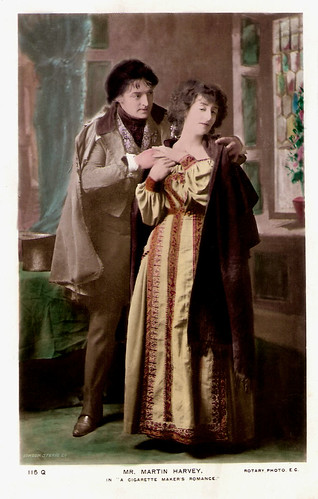
British postcard by Rotary, no. 115 Q. Photo: London Stereoscopic Co. Still for the stage play 'A Cigarette Maker's Romance', based on the 1890 novel by Francis Marion Crawford. Martin Harvey performed Count Skariatine in this successful play from 1901 to 1939. It was also filmed with him in the lead, A Cigarette-Maker's Romance (Frank Wilson, 1913).
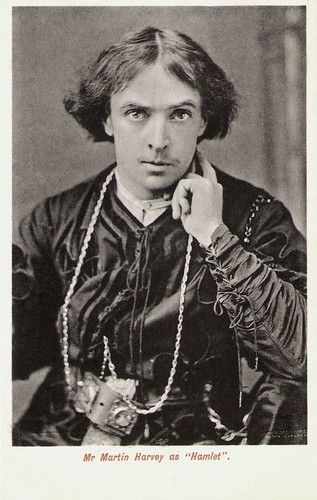
British postcard. Photo: publicity still for a stage production of 'Hamlet' (1904).
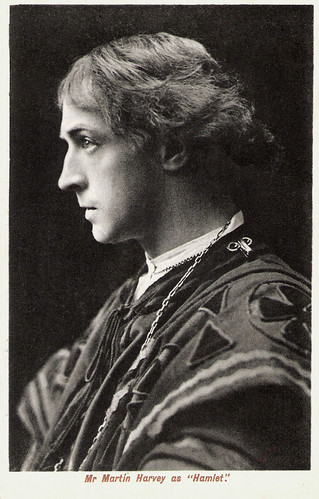
British postcard. Photo: publicity still for a stage production of 'Hamlet' (1904).
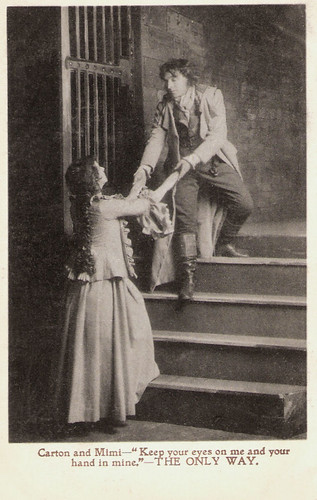
British postcard by London Stereoscopic Company c series. Photo: publicity still for the stage play 'The Only Way'. In 1899, 'The Only Way', an adaptation of Charles Dickens's 'A Tale of Two Cities' proved a phenomenal success, registering over 5000 performances over forty years and guaranteeing Harvey's financial security.

British postcard by Beagles Postcards, no. 83Z. Martin Harvey as Sydney Carton and Nina de Silva as Mimi in 'The Only Way'.
John Martin Harvey also appeared in some short silent films like A Cigarette-Maker's Romance (Frank Wilson, 1913) and The Broken Melody (Cavendish Morton, 1916). During the First World War, he delivered a large number of recruiting lectures on Sunday evenings in leading theatres throughout the United Kingdom, beginning in September 1914. By collections made there and elsewhere, he raised sums for the British Red Cross, and for wounded soldiers, nurses and other sufferers by the war. It amounted in all to about 25,000 pounds.
He also appeared in the film version of The Only Way (Herbert Wilcox, 1925), again as Sydney Carton. This was the first 10,000-foot film made in Great Britain. There were numerous tinted sections, and the final scene where Carton goes to the guillotine was tinted in pink. By the time he retired, Martin Harvey claimed to have performed 'The Only Way' more than 3,000 times, though this would not have been possible in reality.
Other films he appeared in during the 1920s were The Breed of the Treshams (Kenelm Foss, 1920) starring Mary Odette, and The Burgomaster of Stilemonde (George J. Banfield, 1929) with Fern Andra. His final film was the sound film The Lyons Mail (Arthur Maude, 1931), a mystery adventure based on a play by Charles Reade.
In 1889 he married Angelita Helena Maria de Silva Ferro, daughter of a Chilean consul and a fellow actor in Irving's company. They had two children, Muriel Martin-Harvey and Michael Martin-Harvey, both successful actors. One of the earliest advocates of a National Theatre, he was made Knight Bachelor of the Order of the British Empire in 1921 for his services to drama. After his knighthood, he was known as Sir John Martin Harvey. In 1924, he was made a Chief of the Sarcee tribes of North-West America, under the name Ta-Decasze (Red Feather).
His Autobiography appeared in 1933, simply titled 'The Autobiography of Sir John Martin-Harvey'. In 1944, John Martin Harvey died at his home in East Sheen, Surrey, aged 80.

British postcard by Beagles, no. 707P. Photo: Ellis and Walery. John Martin Harvey and Nina de Silva. It is unclear to which stage play this refers.

British postcard by Beagles, no. 695E. Photo: Ellis and Walery. John Martin Harvey in 'The Breed of the Treshams'. John Martin Harvey played Reresby 'the Rat' in many stage productions between 1903 and 1934 as well as in the film The Breed of the Treshams (Kenelm Foss, 1920) with Mary Odette.

British postcard by Beagles, no. 726B. Photo: Ellis and Walery. Martin Harvey in the Dion Boucicault play 'The Corsican Brothers' (1852), based on Alexandre Dumas' 1844 novel. 'The Corsican Brothers' was filmed several times. There were already five adaptations in the silent era, by G.A. Smith (1898), Dicky Winslow (1902), George Lessey (1912), King Baggot (1915), André Antoine (1917), and Louis J. Gasnier (1920).
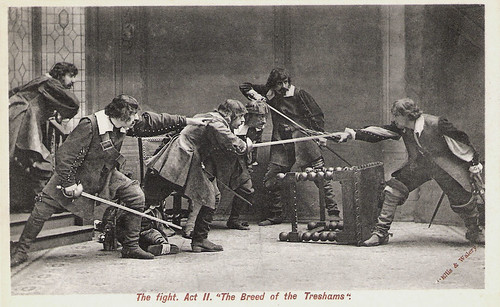
British postcard by the London Stereoscopic Company. Sent by mail in 1906. Photo: publicity still for the stage play 'The Breed of the Treshams'.
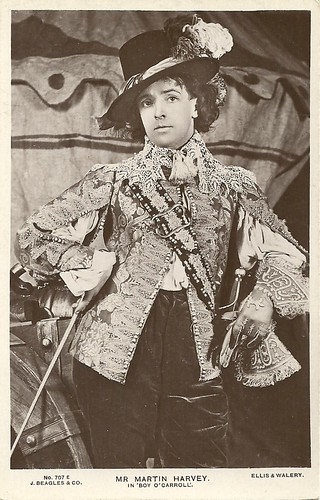
British postcard by J. Beagles & Co., no. 707. Photo: E. Ellis & Walery. Martin Harvey in 'Boy O'Carroll', a period piece play by Beulah Marie Dix and G. Sutherland, which was performed at the London Imperial Theatre in May-June 1906. Harvey's co-star in the play was his wife Nina de Silva.

British postcard by Rotary Photo, E.C., no. 4229 R. Camera study by Arbuthnot & Hoppe. John Martin Harvey as Oedipus in 'Oedipus Rex', staged in Covent Garden, London and opening January 1912. It was produced by Max Reinhardt and based on an adaptation of Sophocles' play by Gilbert Murray. Previously, Reinhardt had already staged a - successful - German version by Hugo von Hoffmansthal, opening in Vienna in 1910. Writer W.B. Yeats saw the London production and called it the most imaginative production of a play he ever saw.
Sources: Iain MacFarlaine (Find a Grave), The Glasgow Herald, Chris Goddard (Webrarian), Encyclopedia Britannica, Wikipedia, and IMDb.
This post was last updated on 21 August 2024.

British postcard by Beagles Postcards, no. 707 C. Photo: Ellis & Walery. Publicity still for the stage play 'The Only Way'.

British postcard by Rotary Photo E.C., no. 115 C. Photo: Bassano.

British postcard by Rotary Photo Co. Ltd., London, no. 115. A.

British postcard by Rotary Photo E.C., no. 115 J. Martin Harvey as Pelleas in Maurice Maeterlinck's 1893 stage play 'Pelleas and Melisande' (Pelléas et Mélisande). Harvey had success with the play in 1898, 1900, and 1911, with Mrs Patrick Campbell as Melisande and incidental music written for the production by Gabriel Fauré.

British postcard by Rapid Photo Co., London, no. 2961. Martin Harvey as Pelleas in Maurice Maeterlinck's 1893 stage play 'Pelleas and Melisande' (Pelléas et Mélisande).
Summer tours
John Martin Harvey was born in Wivenhoe, Essex, in 1863. He was the son of John Harvey, a yacht designer and shipbuilder, and Margaret Diana Mary Goyder.
He was educated at the Old Grammar School in Paisley and the King’s College School in London. His father expected him to follow his own profession, but Martin Harvey had his sights set on the stage.
One of his father's clients was the dramatist W. S. Gilbert, and it was through Gilbert that young 'Jack' Martin Harvey met his first teacher, John Ryder. At the age of 18, he made his first public appearance at the Court Theatre in London in the play 'To Parents and Guardians' in 1881.
A year later he joined Sir Henry Irving's Lyceum Theatre company. His first role was a non-speaking part in William Shakespeare's 'Much Ado About Nothing'.
He remained there for 14 years, playing minor parts in London but leading parts during summer tours in such plays as 'Lady of Lyons', 'Othello' and 'The Corsican Brothers'. He also travelled four times with the company to the United States.

British postcard by the London Stereoscopic Company. Photo: publicity still for 'The Only Way'.

British postcard by Rotary, no. 115 N. Photo: London Stereoscopic Co. Still for the play 'Rouget de l'Isle' by Freeman Wills and Fitzmaurice King. Martin Harvey performed the play about the composer of the French National Anthem, 'La Marseillaise', at the Prince of Wales Theatre, London, in May 1900.

British postcard by J. Beagles & Co. Ltd., London, no. 1295. Photo: The Stereoscopic Co.

British Rotophot postcard by J. Beagles & Co, London, no. 9185. Photo: Stereoscopic Co., Berlin.
The only way
John Martin Harvey's greatest success came in 1899 when he took over the management of the Lyceum. He excelled in the lead role of Sydney Carton in 'The Only Way', and his wife, Nina de Silva, played Mimi. She had suggested, planned, and named the play, an adaptation of Charles Dickens' 'A Tale of Two Cities'. There was already a play called 'Sidney Carton, or a Tale of Two Cities'.
In the end, the playwrights were two Irish clergymen, Freeman Wills and Frederick Langbridge but it was Angelita who came up with the title 'The Only Way'. Years later, it was made into a film, The Only Way (1927) shot at Twickenham Studios. John Martin Harvey starred in the lead role and the film was a commercial success.
Harvey’s other successes included the title role in 'Hamlet' (1904) and Pelleas in Maurice Maeterlinck's 'Pelleas and Melisande' (1898, 1900, 1911), with Mrs Patrick Campbell as Melisande and incidental music written for the production by Gabriel Fauré.
After Sir Henry Irving died in 1905, Martin Harvey continued to revive his old manager's plays, often using Irving's own props which he had bought. These plays included 'The Bells' and 'The Lyons Mail'. He did many tours in both Great Britain and North America. His success was always bigger in Canada than in the United States, and bigger outside London than in the capital.
His later successes included 'A Cigarette-maker's Romance', George Bernard Shaw's 'The Devil's Disciple', Maeterlinck's 'The Burgomaster of Stilemonde', and William Shakespeare's 'Richard III' and 'The Taming of the Shrew'. One of his finest performances was in 1912 as the protagonist in Max Reinhardt’s Covent Garden production of 'Oedipus Rex' in London.

British postcard by Rotary, no. 115 Q. Photo: London Stereoscopic Co. Still for the stage play 'A Cigarette Maker's Romance', based on the 1890 novel by Francis Marion Crawford. Martin Harvey performed Count Skariatine in this successful play from 1901 to 1939. It was also filmed with him in the lead, A Cigarette-Maker's Romance (Frank Wilson, 1913).

British postcard. Photo: publicity still for a stage production of 'Hamlet' (1904).

British postcard. Photo: publicity still for a stage production of 'Hamlet' (1904).

British postcard by London Stereoscopic Company c series. Photo: publicity still for the stage play 'The Only Way'. In 1899, 'The Only Way', an adaptation of Charles Dickens's 'A Tale of Two Cities' proved a phenomenal success, registering over 5000 performances over forty years and guaranteeing Harvey's financial security.

British postcard by Beagles Postcards, no. 83Z. Martin Harvey as Sydney Carton and Nina de Silva as Mimi in 'The Only Way'.
Red feather
John Martin Harvey also appeared in some short silent films like A Cigarette-Maker's Romance (Frank Wilson, 1913) and The Broken Melody (Cavendish Morton, 1916). During the First World War, he delivered a large number of recruiting lectures on Sunday evenings in leading theatres throughout the United Kingdom, beginning in September 1914. By collections made there and elsewhere, he raised sums for the British Red Cross, and for wounded soldiers, nurses and other sufferers by the war. It amounted in all to about 25,000 pounds.
He also appeared in the film version of The Only Way (Herbert Wilcox, 1925), again as Sydney Carton. This was the first 10,000-foot film made in Great Britain. There were numerous tinted sections, and the final scene where Carton goes to the guillotine was tinted in pink. By the time he retired, Martin Harvey claimed to have performed 'The Only Way' more than 3,000 times, though this would not have been possible in reality.
Other films he appeared in during the 1920s were The Breed of the Treshams (Kenelm Foss, 1920) starring Mary Odette, and The Burgomaster of Stilemonde (George J. Banfield, 1929) with Fern Andra. His final film was the sound film The Lyons Mail (Arthur Maude, 1931), a mystery adventure based on a play by Charles Reade.
In 1889 he married Angelita Helena Maria de Silva Ferro, daughter of a Chilean consul and a fellow actor in Irving's company. They had two children, Muriel Martin-Harvey and Michael Martin-Harvey, both successful actors. One of the earliest advocates of a National Theatre, he was made Knight Bachelor of the Order of the British Empire in 1921 for his services to drama. After his knighthood, he was known as Sir John Martin Harvey. In 1924, he was made a Chief of the Sarcee tribes of North-West America, under the name Ta-Decasze (Red Feather).
His Autobiography appeared in 1933, simply titled 'The Autobiography of Sir John Martin-Harvey'. In 1944, John Martin Harvey died at his home in East Sheen, Surrey, aged 80.

British postcard by Beagles, no. 707P. Photo: Ellis and Walery. John Martin Harvey and Nina de Silva. It is unclear to which stage play this refers.

British postcard by Beagles, no. 695E. Photo: Ellis and Walery. John Martin Harvey in 'The Breed of the Treshams'. John Martin Harvey played Reresby 'the Rat' in many stage productions between 1903 and 1934 as well as in the film The Breed of the Treshams (Kenelm Foss, 1920) with Mary Odette.

British postcard by Beagles, no. 726B. Photo: Ellis and Walery. Martin Harvey in the Dion Boucicault play 'The Corsican Brothers' (1852), based on Alexandre Dumas' 1844 novel. 'The Corsican Brothers' was filmed several times. There were already five adaptations in the silent era, by G.A. Smith (1898), Dicky Winslow (1902), George Lessey (1912), King Baggot (1915), André Antoine (1917), and Louis J. Gasnier (1920).

British postcard by the London Stereoscopic Company. Sent by mail in 1906. Photo: publicity still for the stage play 'The Breed of the Treshams'.

British postcard by J. Beagles & Co., no. 707. Photo: E. Ellis & Walery. Martin Harvey in 'Boy O'Carroll', a period piece play by Beulah Marie Dix and G. Sutherland, which was performed at the London Imperial Theatre in May-June 1906. Harvey's co-star in the play was his wife Nina de Silva.

British postcard by Rotary Photo, E.C., no. 4229 R. Camera study by Arbuthnot & Hoppe. John Martin Harvey as Oedipus in 'Oedipus Rex', staged in Covent Garden, London and opening January 1912. It was produced by Max Reinhardt and based on an adaptation of Sophocles' play by Gilbert Murray. Previously, Reinhardt had already staged a - successful - German version by Hugo von Hoffmansthal, opening in Vienna in 1910. Writer W.B. Yeats saw the London production and called it the most imaginative production of a play he ever saw.
Sources: Iain MacFarlaine (Find a Grave), The Glasgow Herald, Chris Goddard (Webrarian), Encyclopedia Britannica, Wikipedia, and IMDb.
This post was last updated on 21 August 2024.
I've inherited a huge amount of memorabilia, photos, letters, documents & original art, through the family. End of Line. Interest is welcome but no photoshoots.
ReplyDelete